The evening included an emotional panel discussion with three Israeli women who described their Oct. 7 experiences.
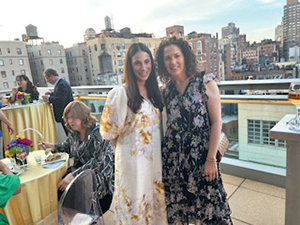
On Monday night, Emunah of America hosted its WOW (Women of Wonder) event on the Upper East Side of Manhattan in the Moise Safra Center. The event was dedicated to the memory of Alana Karp, z”l. Karp had been the senior director of events and young leadership at Emunah, but passed away several years ago, at a young age.
The event featured three speakers: Ruth Greenglick, an Emunah social worker in Israel whose son Shauli, HY”D fell in Gaza; Adi Efrat, a survivor of Kibbutz Be’eri; and Millet ben Haim, a survivor of the Nova Music Festival.
Careena Parker, of Englewood, the president of Emunah of America, spoke first. “Since 1935, Emunah has provided crucial support to thousands of Israelis. Emunah is dedicated to caring for the most vulnerable children and families in Israel. As we rebuild Israel, let us all embrace the spirit of ‘emunah’ for a future filled with hope and promise.”
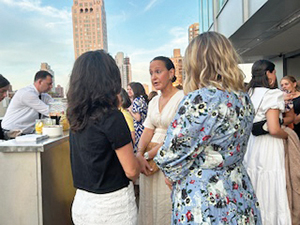
Hila Stern, CEO of Emunah, then asked the three guests her prepared questions. She began by asking them about their experience at the Celebrate Israel Parade on Sunday. Ben Haim answered, “For me it was very hard. I had a severe panic attack before. It’s not easy for me to go to crowded places now. I used to love those kinds of things.” Efrat also had a hard time at the parade. “I knew that this parade was different. This time we were not celebrating Israel but saying, ‘Bring them home.’ And we were saying, ‘We will dance again.’ And seeing all that support from all the people around us — not only the people marching, but also those that came to cheer, made me understand that we are not alone in Israel.”
Stern’s next question was directed at Efrat, who had been captured by Hamas terrorists and held hostage for several hours. “How did you survive those hours?” asked Stern.
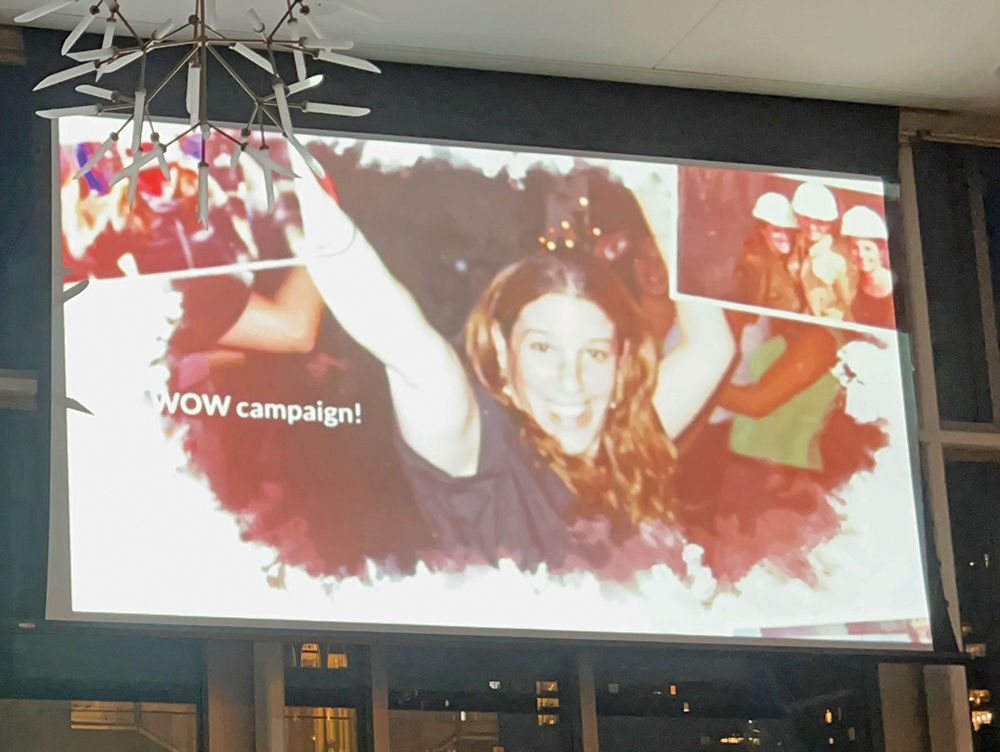
“The main thing that helped me,” answered Efrat, “was that I felt I was holding onto my humanity, to my knowing that these are monsters and I am not. There was actually one moment when I was in a house with 15 terrorists and for one second, one of them looked at me and I looked at him. And I recognized a glimpse of humanity in him. In that look we shared, I felt that we were both feeling, ‘How the heck did we get to this situation?’ And somehow we smiled at each other. It was surreal. But knowing that I can recognize humanity when I see it strengthened me. Also, I tried to give myself therapy. I told myself: ‘Breathe. Look — the sun is shining and right now you are OK. Don’t think about the future. Don’t think about your family worrying about you. The worst has happened to you, so now you need to focus on yourself and survive. So breathe.’”
Stern directed her next question to Greenglick. “How did this change you as a therapist?” Greenglick answered, “For a year before Shauli died, I was working with bereaved families. I didn’t think they would want me to come back after. But my supervisor told me, ‘See what you want to do.’ I then realized there are very few times when you can do instead of talk. What did I do with these families before? I told them that life goes on. You need to work through these hard times and choose to believe that things will get better. So, if I leave, was I lying for a year? I cried and I said: ‘I must go back. I want to go back.’ But it’s not easy.”
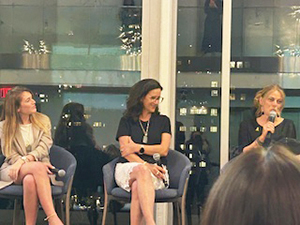
Stern’s next question was directed at Ben Haim. “Your videos since Oct. 7 have gone viral and been watched by millions of people. You’ve been interviewed in the U.S. and in Europe. It feels like the world is watching but we are losing the hasbara war because of our small numbers. Does that discourage you or drive you forward?”
“We are 0.2% of the population,” Ben Haim said. “And that keeps me motivated because every single voice counts. We have to speak up. I was the first Nova survivor to speak. I knew I had to travel abroad and post on social media. And I had to meet people in person. The world is lacking empathy, so we need to speak up against that and we need to make this world a better place.”
Stern followed up, “You are a part of the Nova exhibit team. Who comes to it? Are the visitors only Jews?” Ben Haim answered, “We have had 75,000 visitors so far, including public schools and churches. When you see a real person talking about their own experience, it changes something. Maybe, after seeing that, they won’t believe everything they see on TikTok as easily.”
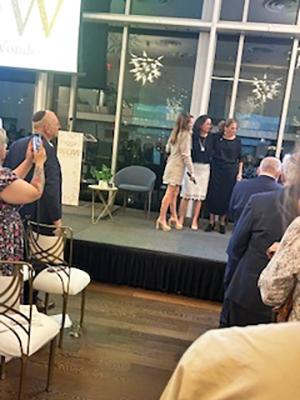
Stern directed the next question back to Efrat. “Adi, you went back to live in Be’eri. Can you tell us what it’s been like to be living there again?”
“We came back in January,” explained Efrat, “and our home had burned down. But before we returned, it was hard to feel a purpose. So, we came back to Be’eri and it felt like it was the best thing to do. It gives me meaning and faith. It’s our role to get Be’eri ready and rebuild it. Many people are living in temporary houses, waiting to come back there. It’s winning our personal war within us. Twenty years ago they bombed Be’eri. At that time I asked myself if I should stay there. And I thought: ‘My parents didn’t make aliyah from Morocco in order for me to run away.
They won’t scare me away from my home.’”
Stern posed her final question to all three women: “There is a word in Hebrew: tekumah — meaning rebirth, revival, recovery. It was used often after the Holocaust. How do you create tekumah in your own lives?”
Greenglick answered first. “Music is very present in our lives. For 30 days after Shauli died, the piano stayed closed. After the shloshim, somebody opened the piano and we started singing. We decided to continue singing. My daughter is a singer and I sometimes perform with her. We feel music is a big part of our lives and we won’t let it die.”
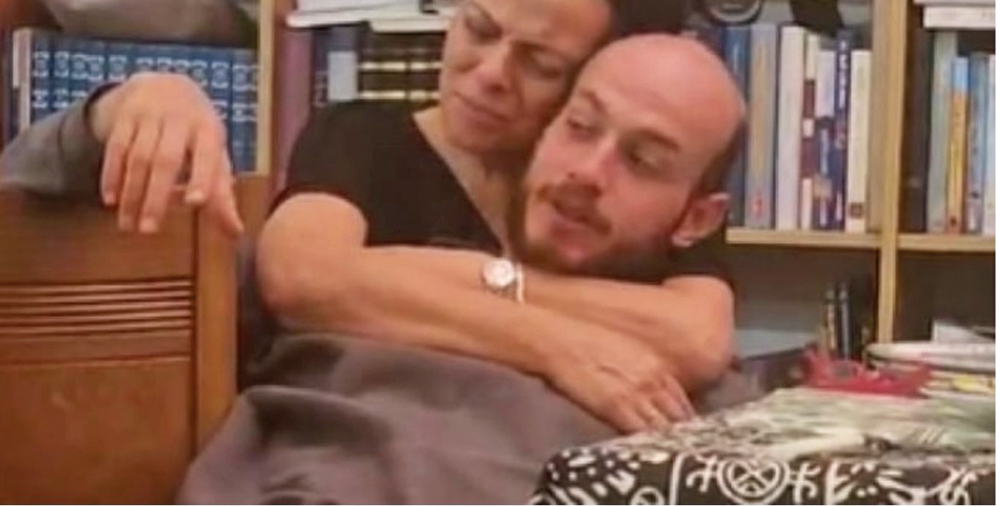
Ben Haim answered next. “I used to love music, dancing and being in nature. Those were my very favorite things in life, and I’m very upset that they nailed it. They traumatized me away from those things. But tekumah for me — the answer is love. I think love is the strongest thing we have and it can overcome anything.”
Efrat answered last. “Tekumah — being here with you all and feeling the support and feeling myself as a small part in the Jewish community gives me a sense of the duty I have and my role in history. Two hundred years from now, this will be five lines in a book. I want to know that I had a role in that and in making sure that Be’eri continued.”









